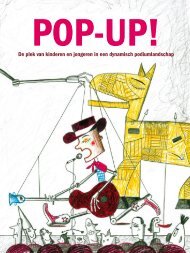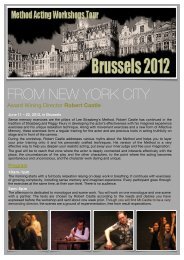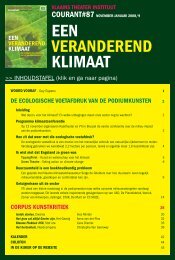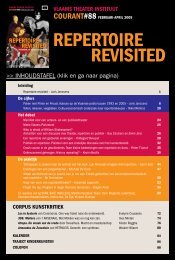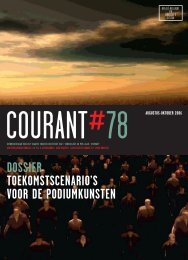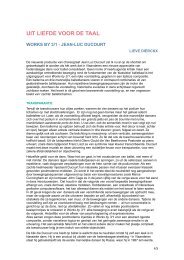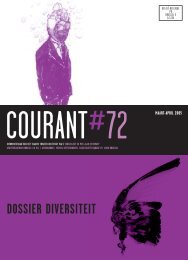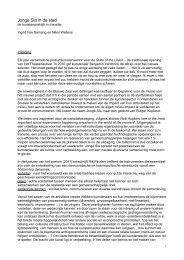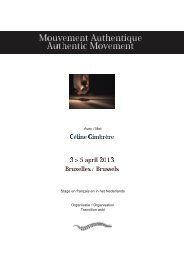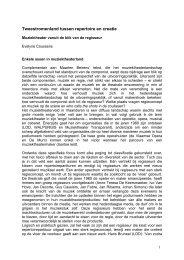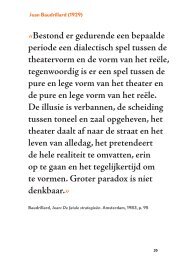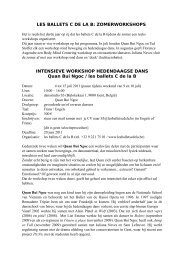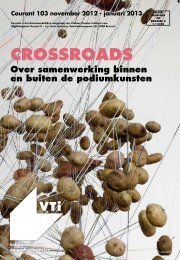music theatre in flanders - Muziekcentrum Vlaanderen
music theatre in flanders - Muziekcentrum Vlaanderen
music theatre in flanders - Muziekcentrum Vlaanderen
Create successful ePaper yourself
Turn your PDF publications into a flip-book with our unique Google optimized e-Paper software.
tre and <strong>theatre</strong> <strong>music</strong>, or is that mere word play? Are there fixed<br />
criteria to def<strong>in</strong>e ‘<strong>music</strong> <strong>theatre</strong>’? The only possible criterion, <strong>in</strong><br />
my op<strong>in</strong>ion at least, is the simultaneous presence of <strong>music</strong>al and<br />
theatrical elements. But def<strong>in</strong><strong>in</strong>g these theatrical elements is yet<br />
another subject for further discussion.<br />
ArTISTIC SyMbIOSIS<br />
Rather than ventur<strong>in</strong>g myself <strong>in</strong>to (objective?) categoriz<strong>in</strong>g and<br />
standardiz<strong>in</strong>g, I will discuss two <strong>in</strong>terrelated conditions which, for<br />
me, are essential to experience my role as a composer <strong>in</strong> a <strong>music</strong><br />
<strong>theatre</strong> piece as substantial.<br />
First of all, there has to be someth<strong>in</strong>g that I could best describe<br />
as an artistic symbiosis. An <strong>in</strong>terest<strong>in</strong>g and <strong>in</strong>spir<strong>in</strong>g symbiosis<br />
between different art forms is established when they re<strong>in</strong>force<br />
each other with<strong>in</strong> the entirety, when each of the two benefits<br />
from the presence of the other and where none of the parties <strong>in</strong>volved<br />
tries to push the other <strong>in</strong>to a subservient or merely illustrative<br />
role. Moreover, symbiosis with<strong>in</strong> a multi-discipl<strong>in</strong>ary work<br />
of art departs from the idea that the outcome will be more than<br />
the sum of the constituents. That is also the reason why I like<br />
the Dutch word ‘muziektheater’, <strong>in</strong> which the two words, ‘<strong>music</strong>’<br />
and ‘<strong>theatre</strong>’ are written as one s<strong>in</strong>gle word, suggest<strong>in</strong>g that the<br />
<strong>music</strong>al and theatrical elements have merged.<br />
For me, <strong>music</strong> as a fellow driv<strong>in</strong>g force beh<strong>in</strong>d the dramatic<br />
development is an essential condition to establish what can be<br />
called ‘<strong>music</strong> <strong>theatre</strong>’. In itself, <strong>music</strong> that merely underscores or<br />
illustrates the action, or that only serves as an <strong>in</strong>terlude between<br />
spoken parts, is not <strong>in</strong>terest<strong>in</strong>g enough for <strong>music</strong> <strong>theatre</strong>. Or let<br />
me put it this way: when I watch and listen to a <strong>music</strong> <strong>theatre</strong><br />
piece, I want to have a feel<strong>in</strong>g of <strong>in</strong>exchangeability of the <strong>music</strong>, to<br />
experience the vital contribution the <strong>music</strong> makes to the artistic<br />
identity of that particular <strong>music</strong> <strong>theatre</strong> piece. That symbiosis is<br />
best established when the makers of a <strong>music</strong> <strong>theatre</strong> production<br />
have the courage to peek over the walls of their own artistic discipl<strong>in</strong>e<br />
and at the same time take their own discipl<strong>in</strong>e’s contribution<br />
entirely seriously. They will automatically and <strong>in</strong>evitably enter <strong>in</strong>to<br />
each other’s artistic territory. This requires mutual trust, openm<strong>in</strong>dedness<br />
and empathy for each other’s art and artistic vision,<br />
will<strong>in</strong>gness to get to know each other, to listen and absorb and to<br />
refra<strong>in</strong> from pass<strong>in</strong>g quick judgments. And, of course, the read<strong>in</strong>ess<br />
to allow the other to be true to him/herself <strong>in</strong> his/her artistic<br />
language.<br />
wOrk prOCeSS<br />
And so, here is our second essential condition: an efficient organization<br />
of the work process, of how the <strong>music</strong> <strong>theatre</strong> production<br />
is accomplished. Writers, <strong>music</strong>ians, actors, s<strong>in</strong>gers, composers,<br />
directors, designers... they all regularly meet under the protective<br />
roof of one of the larger Flemish <strong>music</strong> <strong>theatre</strong> organizations. But<br />
every so often, the meet<strong>in</strong>gs take place by chance, with no organization<br />
<strong>in</strong>volved. For practical, organizational reasons, work<strong>in</strong>g<br />
under one of these roofs often is an asset, for <strong>in</strong>stance because<br />
the artists no longer have to worry about practical matters and<br />
because there is an entire team, ready to organize communication,<br />
rehearsal room and schedules… These major organizations<br />
also have a stronger network of artists <strong>in</strong> every possible art discipl<strong>in</strong>e,<br />
of venues and potential co-producers. These major <strong>music</strong><br />
<strong>theatre</strong> houses often also work with composers <strong>in</strong> residence, the<br />
performance of whose artistic output is thus secured, and who,<br />
<strong>in</strong> turn, co-determ<strong>in</strong>e the house’s artistic identity. On the other<br />
hand, a large organization also implies a certa<strong>in</strong> degree of <strong>in</strong>stitutionaliz<strong>in</strong>g.<br />
70 71<br />
table of contents



